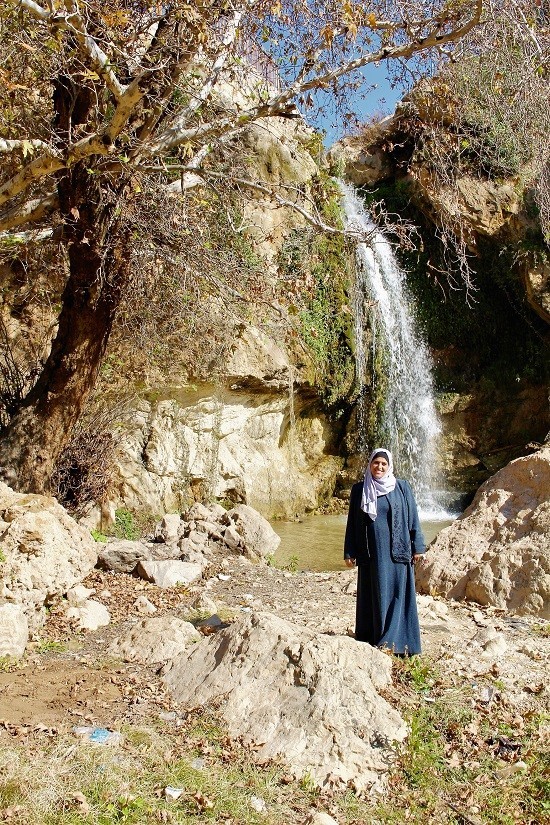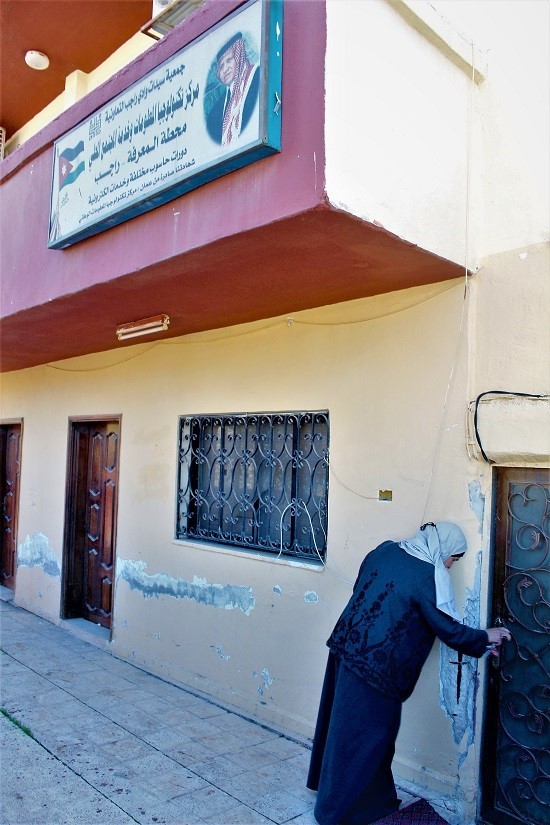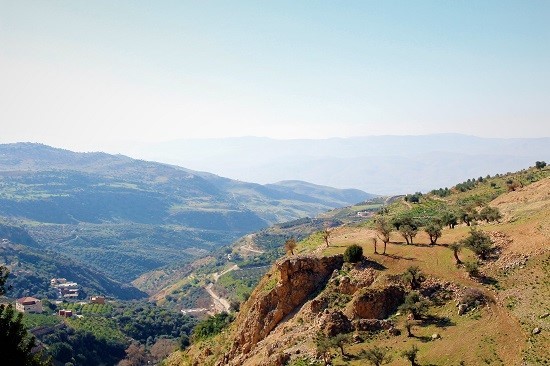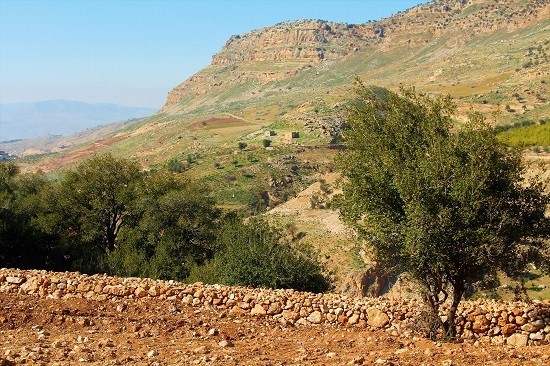AMMAN — Wadi Rajeb, the “food basket” of Jordan, boasts one of the most beautiful
natural
landscapes in the country, featuring craggy cliffs, babbling brooks
meandering between a succession of year-round waterfalls, and breathtaking
views of terraced olive trees, lush citrus groves and sprawling loquat farms
watered by a system of 14 spring-fed irrigation canals.
اضافة اعلان
Despite its natural
beauty and its importance as a major source of both food and water for the
country, the stunning wadi is virtually unknown outside of its immediate
vicinity, in
Ajloun Governorate. This is a problem for local residents, who
would like to see both the government and the private sector invest more in the
region’s ecotourism and environmental conservation efforts.
 Director of the Wadi Rajeb Women Cooperative Moza Fraihat poses for a photo.(Photo: Zane Wolfang/Jordan News)
Director of the Wadi Rajeb Women Cooperative Moza Fraihat poses for a photo.(Photo: Zane Wolfang/Jordan News)
Moza Fraihat is at the forefront of local efforts to
leverage the area’s economic potential. The director of the Wadi Rajeb Women
Cooperative is a trailblazing matriarch and a tireless advocate for her
community, and she has successfully applied for several grants from the
UNDP and other international funding institutions since opening the cooperative in
2005, including a $30,000 grant to train locals on community management of the
local ecosystem and a $21,000 grant for another training course on natural and
agricultural resource management.
She is no stranger to the grueling process of
seeking and obtaining financial support to further the development of her rural
community.
Fraihat, who was working on a new grant application
when she sat for an interview at the Women Cooperative headquarters in Rajeb
village, has plenty of ideas about both conservation and ecotourism in her
hometown and presented those ideas to various government officials and
representatives many times over the years. When asked why the area she was born
and raised in remains virtually unknown despite its vast potential, Fraihat was
straightforward: “There is no funding. There is no support.”
 The headquarters of the Wadi Rajeb Women Cooperative. (Photo: Zane Wolfang/Jordan News)
The headquarters of the Wadi Rajeb Women Cooperative. (Photo: Zane Wolfang/Jordan News)
She said that the regional and national governments
have never responded to local requests for investment, explaining: “We always
ask the Ministry of Tourism, the Ministry of Agriculture, the government — we
talk to them, we write to them, we visit the ministry — there is never any
support for Wadi Rajeb in the end.”
As a consequence, the wadi’s attractions remain undeveloped
and unadvertised, even as areas like Wadi Mujib, Ajloun, and Dana have seen
their natural spaces officially designated as national wildlife reserves and
begun to benefit from ecotourism campaigns marketed by well-funded
organizations like the Jordan Tourism Board, the Royal Society for the
Conservation of Nature and its affiliated ecotourism company Wild Jordan.
Wadi Rajeb is not included in the Jordan Tourism
Board’s “meaningful travel map”, nor in its “Eco and Nature in Jordan”
brochure, and the region is not mentioned on the
Royal Conservation Society or
Wild Jordan websites at all.
Despite its
abundant attractions — hiking trails, waterfalls, day resorts, and
archaeological sites, including an ancient castle and the ruins of a church
known locally as Deir Mesmar, which local lore holds was discovered by King
Abdullah while he was serving in the Special Forces — the area is rarely
marketed by private tourism companies, and is not even widely known amongst
professional tour guides in Jordan, who usually bypass it on trips to
well-known destinations like Jerash, Karak, Ajloun, and Umm Qais.
 (Photo: Zane Wolfang/Jordan News)
(Photo: Zane Wolfang/Jordan News)
In comments to Al-Rai newspaper last week, Bassam
Fraihat, Moza’s brother and the mayor of the Rajeb municipality, stressed the
importance of placing the wadi’s natural and historical attractions on official
tourist maps in order to attract more visitors, and voiced his desire to see
Wadi Rajeb linked with famous tourist trails such as the Jordan Trail.
Rajeb lies southwest of the internationally
acclaimed trail as it snakes through nearby Ajloun on its way south to Aqaba,
and thus is not mentioned on the official Jordan Trail website.
Firas Taybeh, owner of Taybeh Organic Farms and
co-founder of the Agricultural and Regenerative Development Company located on
the grounds of the farm between Rajeb village and Kufranja Dam, seems to
support the approach of the Women’s Cooperative in the sense that he believes
many stakeholders in the local community need to receive training in order to
properly develop a sustainable ecotourism industry.
Despite his reservations about the community’s
current level of exposure to ideas about environmental stewardship (and his
acknowledgment that his own company’s sustainability courses are not really
marketed toward his local neighbors), Taybeh agreed that establishing a branch
of the Jordan Trail to Wadi Rajeb, “would be a good opportunity and could
become a good tourist attraction”.
 (Photo: Zane Wolfang/Jordan News)
(Photo: Zane Wolfang/Jordan News)
When
Jordan News asked the Jordan Tourism Board if
it had ever done any marketing for Wadi Rajeb or if it had any plan to do so,
one marketing staff member acknowledged that the board does not actively
promote any attractions or activities in that area. Another staff member, who
heads the adventure tourism marketing department, stated during a phone interview
that the reason the
Jordan Tourism Board has never advertised in Wadi Rajeb is
that nobody from the region has ever reached out to the board to initiate any
form of cooperation.
At that point, Moza Fraihat was immediately handed
the phone. She spoke to the man for several minutes about her community’s need
for support, investment, and advertising,
and was able to secure an email address and a vague assurance that
future communication between them could lead to the planning of a visit to the
wadi in order to begin planning some marketing activities.
Time will tell if the offer to address the region’s tourism
potential was sincere, but now, the board has surely heard a direct appeal from
a strong advocate of Wadi Rajeb.
Read more Around Jordan





